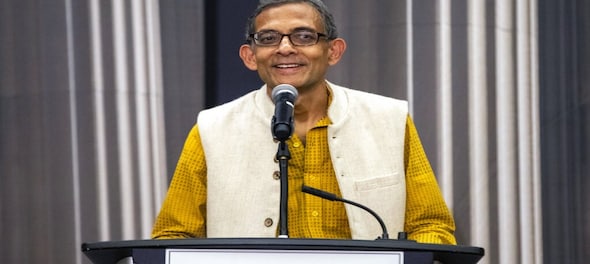
Nobel Laureate Professor Abhijit Banerjee on Friday said a lot of things are being said about Indian democracy, many beyond comprehension. "There is a debate on whether there is democracy in India or majoritarianism," he said, adding that it is easy to say we should deepen our democracy.
Banerjee was giving the Justice Sunanda Bhandare Memorial Lecture in New Delhi on Friday, November 4. His presentation was titled 'Why Doesn't Indian Democracy Deliver More?'
Talking about the elections, the professor said people are usually extremely energised during elections, as one can see is the case in Gujarat and Himachal Pradesh, with the upcoming Assembly elections.
He said there are a lot of standard ways of majoritarian democracy seen on the ground. People are exiting from government-led education, healthcare, children are moving out of government schools, etc, he said, adding that there is poor targeting, lots of leakages through social transfers. "Competitive elections put pressure on delivery,” he said, adding that there are many sources of failures in democracy.
Banerjee spoke about the three forms of failures — implementation, failure by design and democratic failure.
Implementation: Banerjee said there are some cases where there are many bureaucratic hurdles, and there is only so much a political system can solve. Some of the implementation has to be done on the ground, he said.
Democratic failure: "The competition that we see does not translate into incentives to perform. There is a sense in which the idea that the competition will generate people take actions that are in the interest of the voters to win, that mechanism does not work as well as it should," he said.
Failure by design: In some ways this is not a failure, he said. "What I mean by failure by design is that I still feel local democracy is a good thing. Even though it is not always the case and people doing their jobs have the competence, I think local democracy is essential in giving people the sense that their choice is directly affecting the outcomes and the immediacy that can't get through any other system. That is failure by design, even when it doesn't work," he said.
Banerjee felt people want reservations. "I think there is fairly compelling evidence that reservations both for Scheduled Caste
Giving an example of reservations for women, he said one can see over a period of time, independent women legislators have emerged as a result of reservation. There is good reason to have reservation, however it will bite one back in other ways, he said, adding that many reservations are implemented at random. "Once you have reservations, then you rotate the reservations. So you have a tension between the commitment to reservation and commitment to let people who are performing well continue," he said, adding that such tensions are built into the nature of democracy.
"I want to say that some of our failure comes from the design, by design. They are trade-offs, we made choices," he said, adding that he supports it.
He also spoke about how many parents want their children to qualify for government jobs. However, that just isn't possible because there aren't enough of them. Banerjee said he has seen 90,000 people lining up for a few 100 jobs.
Banerjee said that ethnocentrism is another source of democratic failure. "In 1969, there was no lower-caste in UP's ministry. Caste-based parties emerged after 1980s," he said.
Banerjee said ethnocentrism leads to tolerance of people from one's own caste, forgiveness of corruption. "As winning share of an ethnic group rises, its financial status falls," he said.



